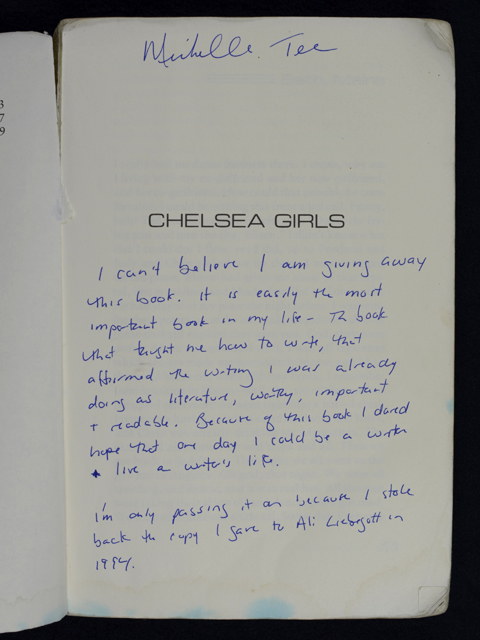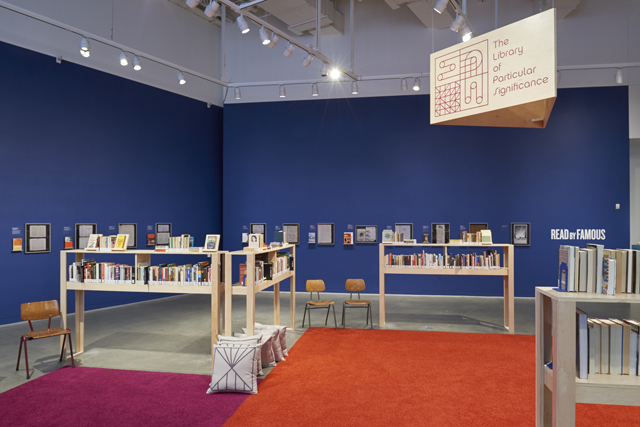Books are powerful mechanisms for encountering and shaping oneself, and for making rapid but lasting connections with strangers. San Francisco-based conceptual artist Josh Greene reminds viewers of this capacity in his solo exhibition Bound to Be Held at the Contemporary Jewish Museum. The gallery holds two intersecting projects: a selection from Greene’s ongoing work Read by Famous, which presents books donated and inscribed by various well-known individuals; and The Library of Particular Significance, a lending library of approximately 1,000 books donated by the public.
Before this show, Read by Famous existed primarily in website form. Standing inches away from these books, one becomes hyper aware of their bent covers and browned pages, their widths and weights, their roles as quiet characters in the room. One can imagine their lives on the shelves of such contributors as Eileen Myles, Junot Diaz, Jimmy Kimmel, Isaiah Thomas, Olafur Eliasson, Catherine Opie and Thao Nguyen, and the journeys they took, wrapped with care, from various cities and towns to the museum.

Reproductions of casual, vibrant inscriptions framed beside each book offer glimpses into the literary paths and personal histories of their previous owners. “Do you believe in magic?” begins Jay Duplass’ note inside Carlos Castaneda’s Journey to Ixtlan. “I was terrified of the witch melting on page 43,” writes Damon Lindelof over the illustrated endpapers of The Wizard of Oz. “I can’t believe I am giving away this book,” exclaims Michelle Tea on the title page of a worn, stained copy of Eileen Myles’ Chelsea Girls.
Some of these notes are matter-of-fact, brief; others feel exuberant and tender. Junot Diaz declares, in a long, thoughtful letter inside Life Magazine Nature Library’s The Earth, “books were my news, my wings, my passport, my mentor, my oracle.”
It is a pleasure to read these honest words, and to picture the moments the owners first felt moved by their beloved books. The show gave me an opportunity to pause and register how certain writers I’ve encountered only on the page have played essential roles in influencing the turns I’ve taken as a reader, writer and evolving individual.
Greene suggests that “in our increasingly fragmented and digitized world, a physical book is an antidote of sorts, providing a reprieve from other aspects of our lives in which we are in a constant state of multi-tasking.”

The Library of Particular Significance –- seven full shelves, cushions, chairs and a table dedicated to checking out books –- certainly feels like a resting ground. Walking the length of each shelf, stopping to flip through novels, biographies, poetry collections, books I’ve read before, books I’d never read, felt nearly identical to browsing a small public library.
The atmosphere, shaped in part by small sounds –- the slight buzz of the lights, the low talk of a father helping his child check out a book, a vibrating phone – was familiar. But Greene has lifted an established, predictable environment from one frame and placed it into another. There is joy and subtle humor in the dissonance of this gesture, enhanced by touches like Greene’s intentionally formal, broad title and the decision to shelve books according to astrological sign. The uncanny magic of the show is that it feels at once relaxed and “significant,” singular and porous.
In a panel presented in conjunction with the exhibition, Read By Famous contributors Eileen Myles, Michelle Tea and Jill Soloway discussed the pain of letting a beloved book go, how this felt like a dare that once met, transformed into a notable loss. Myles, comparing this experience to what a painter must feel when selling a piece, suggested that the hole this act creates inevitably gets filled, and the resulting chain reaction of loss and gain is a “way into art.” As orchestrator of these numerous “plotlines,” as Myles called them, Greene gives us access to his voice, one that is confident enough to trust in the resonance of small objects, shared texts and quiet gathering spaces.